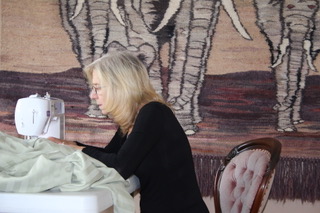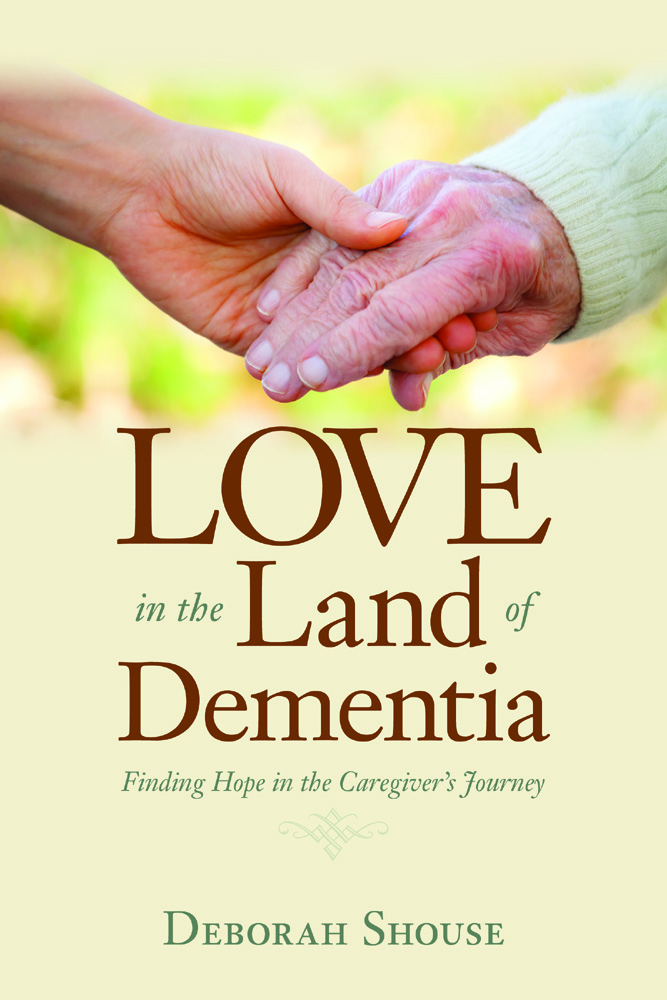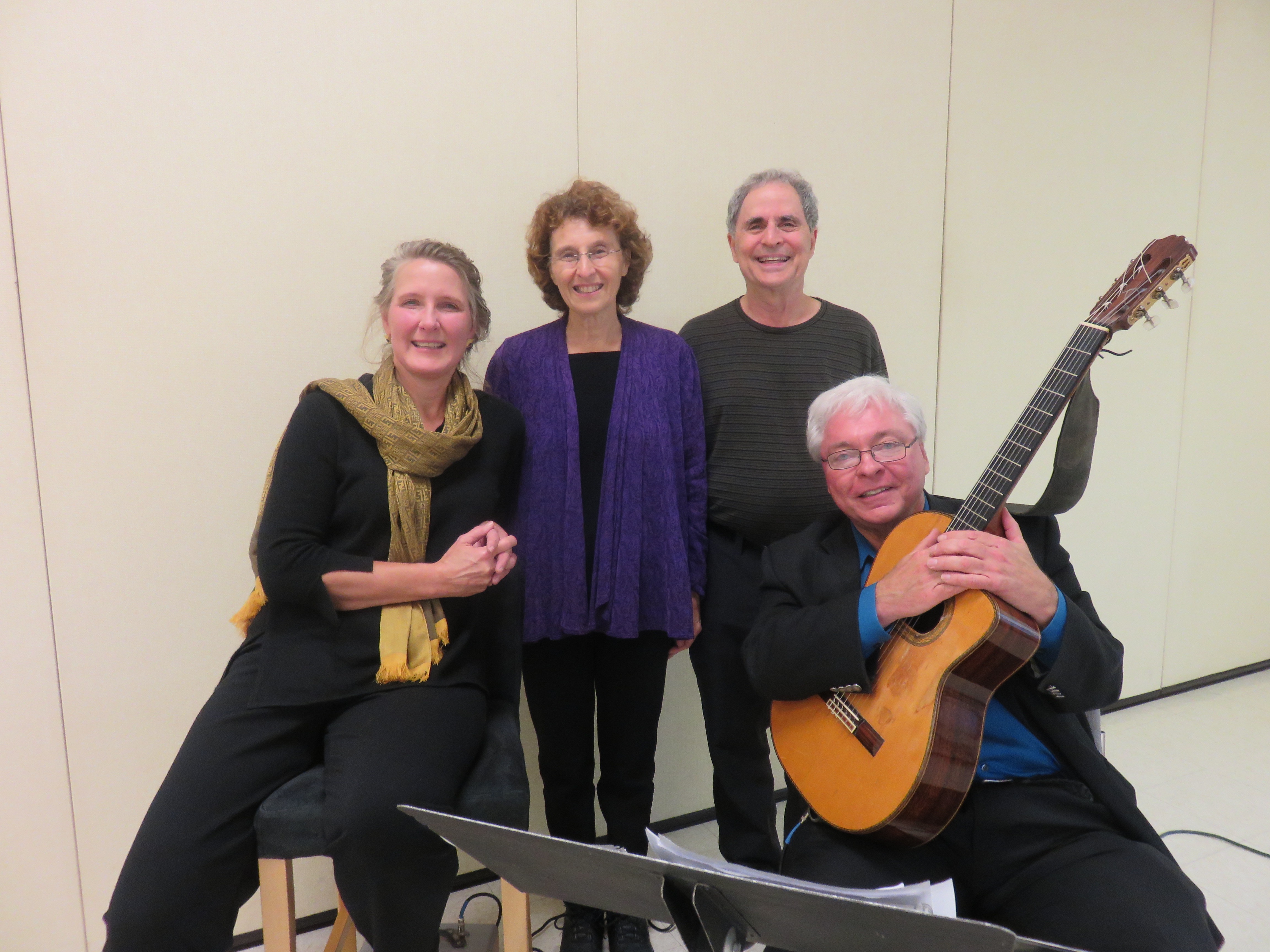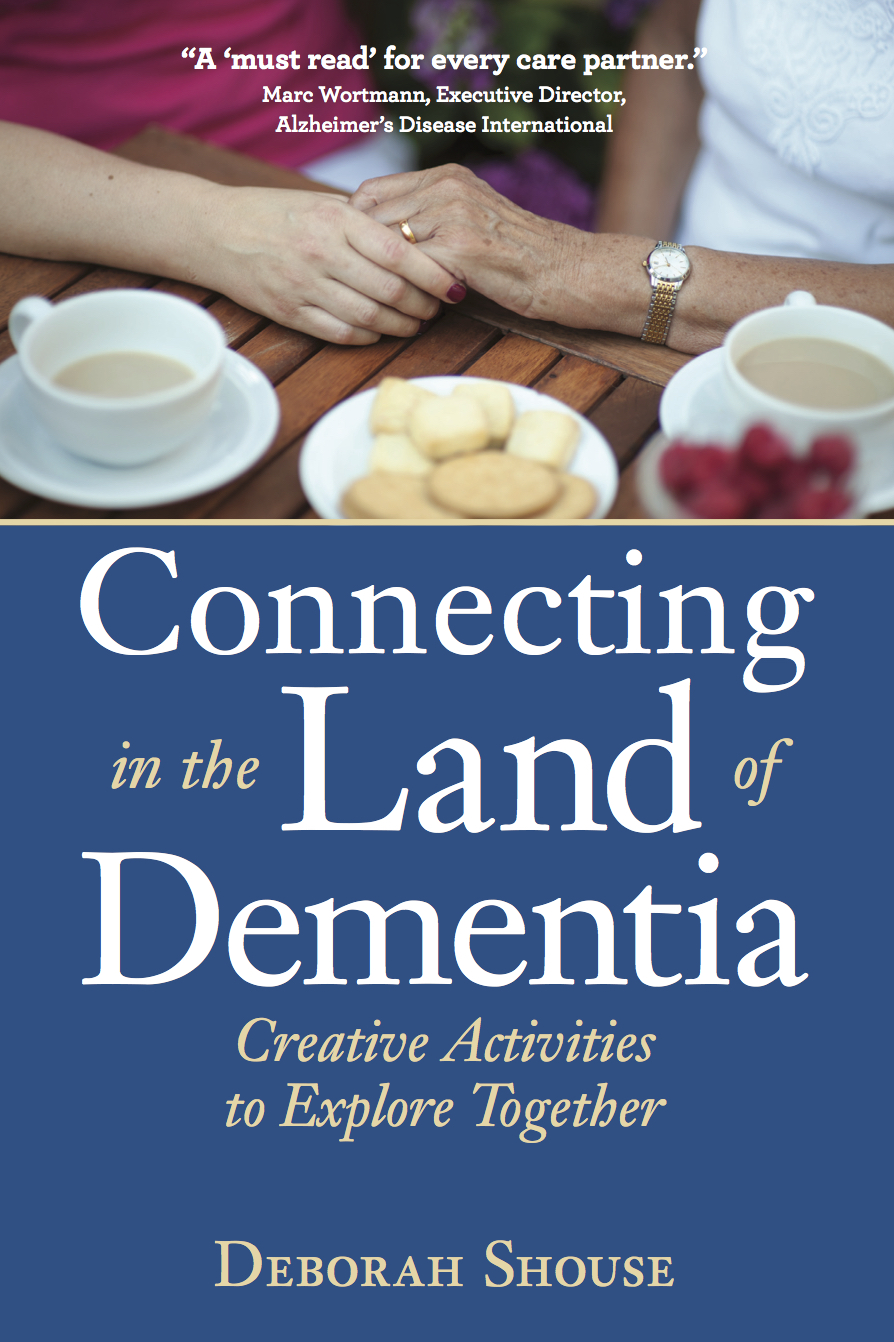Relationships
An Insider’s Look at True Love: Charlie and Elizabeth’s Story
For years, I interviewed fascinating couples every week for a column in the Kansas City Star. Talking to people who are in love is always inspiring; often couples have to overcome enormous obstacles to bring their relationship into reality. One of my favorite stories stars two friends whose love and cosmic connection shines out from their faces and rings out with their words. Here is an short version of their beautiful story, an insider’s look at true love.
**
The coffee date was going better than Charlie, age 60, could have ever imagined. Just a month earlier, his best friend had burst into Charlie’s dark apartment and roused Charlie from his lethargy, saying, “You need to open up these windows and let some light in. You should start dating.”
“Who would go out with a guy who has Early Onset Alzheimer’s?” Charlie asked his friend.
“Maybe you should find out,” his friend replied.
So Charlie Miller pried himself out of his depression and joined eHarmony. And this coffee date with Elizabeth Hack was the result.
Elizabeth, age 55, was brilliant, interesting, energetic, curious, and shared many of Charlie’s interests. When she asked Charlie what he liked to do, he mentioned listening to music, attending theater, visiting with friends and volunteering for the Alzheimer’s Association.
Elizabeth knew nothing about Alzheimer’s. She asked, “Does someone close to you have the disease?”
“Yes,” Charlie answered. He wanted to say more but the words stuck in his throat. He had never envisioned this casual meeting could possibly turn into a romance. Yet he was already comfortable with Elizabeth and felt their relationship was meant to be.
Over the weeks, they continued seeing each other, meeting at concerts, going to plays, and exploring new restaurants. As their friendship deepened. Charlie knew he had to share his diagnosis with Elizabeth and he worried she wouldn’t be able to accept it.
But before he had a chance to broach the subject, Elizabeth, wanting to learn more about Alzheimer’s and about Charlie’s interests, visited the local Alzheimer’s Association website and noticed a picture of Charlie, as a volunteer and a person who has Alzheimer’s. She was shocked, dismayed, and confused. But she was also in love with Charlie; his diagnosis did not diminish her deep feelings for him.
 Charlie suggested she meet with his social worker at the Association to learn more about the disease. Elizabeth did that and though the information was daunting, her connection with Charlie was strong and true; she, too, felt they were destined to be together.
Charlie suggested she meet with his social worker at the Association to learn more about the disease. Elizabeth did that and though the information was daunting, her connection with Charlie was strong and true; she, too, felt they were destined to be together.
They began traveling and made plans to move in together. In a vineyard restaurant in Napa Valley, Charlie proposed and Elizabeth said Yes. Today, they are living happily, grateful they have found each other
“None of us know what will happen next,” Elizabeth says. “Just the other night, we were at a dinner party. One friend was just released from the hospital after heart surgery, and another friend was facing a hip replacement. I felt concerned for my friends and I felt so lucky that Charlie and I were happy and together. We are dedicated to living with joy and curiosity in the present moment.” 
Deborah Shouse is the author of Connecting in the Land of Dementia: Creative Activities to Explore Together and Love in the Land of Dementia: Finding Hope in the Caregiver’s Journey.
Five Ways to Make Valentine’s Day Special for a Loved One with Dementia
My parents liked to celebrate Valentine’s Day with dinner and dancing. Years into my mom’s Alzheimer’s journey, my parents’ love hadn’t diminished, but my mom’s capacity for going out to dinner and dancing had drastically decreased. I saw how blue my father was—one more event he had to give up, one more change in the woman he loved—and I searched for alternatives that might cheer him up. Here are five ways to make Valentine’s Day special.
Look for a favorite thing. Seek one simple pleasure your loved one might enjoy. Mom loved potato soup and chocolate and fresh strawberries. These were part of our celebration.
Nurture yourself: include your own favorite thing. Bring yourself into the celebration and include something that makes you happy. I brought foods my father and I both liked as part of our little party.
Pick several ways to express your love. Poetry, music, gifts, flowers, and photo albums—you can use any of these resources as a catalyst to talk about your feelings. Dad and I sang Mom old show tunes and love songs, music she really enjoyed. Mom adored Shakespeare; we had a couple of sonnets on hand. She and Dad had once created a beautiful flower garden; Dad brought her a single red rose.
Take joy in the simple act of expressing yourself. Being with my mom was a chance to really practice the mythical “unconditional love.” Mom couldn’t tell me she loved me. During one Valentine’s Day celebration, she fell asleep while I was holding her hand and talking sweetly to her. But there was a comfort in expressing my love and I kept on talking.
Celebrate love in all its glorious guises. During their long marriage, my father had walked into a room millions of times and often, Mom had been busy and hadn’t particularly smiled or remarked. But with her dementia came a deep dependency on Dad. When Dad walked into a room, my mother’s face lit up. My father basked in that light. The sparkle in my mother’s eyes was the new, “I love you, darling.” The light said everything my mother could no longer say.
Deborah Shouse is the author of Connecting in the Land of Dementia: Creative Activities to Explore Together and Love in the Land of Dementia: Finding Hope in the Caregiver’s Journey.
Five Secrets For Making Date Night Great
I caught up with Nettie Harper and Kelly Gilligan, co-founders of Inspired Memory Care, Inc. as they were rushing down the streets of Manhattan, off to consult with a client. I loved hearing the city sounds, horns honking, cars edging past, a lone dog barking, as they shared their five secrets for making date night great. (I have changed the names in this story to protect people’s privacy.)
During my mother’s journey through dementia, my father was always seeking ways to stay connected with her. He would have loved the ideas in this article.
Five Secrets For Making Date Night Great!
Margaret slipped on a string of pearls and surveyed herself in the bathroom mirror. Her royal blue silk dress, one that her husband Harold had bought her for their 40th wedding anniversary, still looked good. She fingered her hair nervously and hoped this evening would go well. Their last weekly dinner date had been a disaster. Harold had felt uncomfortable in the restaurant, even though they’d chosen it together. He picked at his food and barely spoke a word. Margaret had to hold back tears as she looked around the brightly lit room and envied all the happy couples and families, laughing, talking, and savoring their food.
Tonight, she vowed, would be different. Tonight, she was prepared, coached by Nettie Harper and Kelly Gilligan of Inspired Memory Care, Inc, in Manhattan, NY.
She’d chosen a quiet restaurant and reserved a cozy corner table, away from the bustle. Harold’s face tightened as they strolled in, but she took his hand and he squeezed hers. After they settled into their seats and ordered their meal, the dreaded silence descended. She was about to say, “Do you remember the time we took my cousin from England out to dinner…?” but she bit her lip. Harold’s eyes went blank when she prodded him for specific memories.
Instead, Margaret unfolded an article on sailing, one of Harold’s passions, and offered it to him. “Could we read this together?” she asked. The large print made it easy to see and Harold began reading aloud, weaving in the open-ended questions Nettie and Kelly had written in for them to discuss.
“What does this make you think of?” he read, after a few moments.
“The sea,” Harold said.
Margaret took a turn reading aloud, and Harold leaned forward a little.
“Would you ever go out on such stormy seas?” she asked.
“If I felt strong I might,” Harold said. “I always liked sailing with you. Remember that time with the snow and the animals? Those big fish?”
Margaret smiled and took Harold’s hand.
“That was our whale watching cruise. I do remember. I really liked the penguins.”
“What did I like?” Harold asked.
“The glaciers,” she said. “And the dancing.”
In their work, Nettie and Kelly often coach care partners like Margaret, offering creative ways to stay connected with loved ones who are living with dementia. Their idea of bringing along an article on one of Harold’s favorite topics transformed the dinner into a time of wonderful sharing. On future date nights, Margaret continued to bring along articles on topics of great interest, as conversation starters.
Nettie and Kelly’s company, Inspired Memory Care, Inc. (IMC), is founded on the belief that older adults, both with and without memory impairment, should have access to life-enriching, esteem-building experiences, sharing their wisdom and pursuing their passions each day.
“We encourage couples and families to commit to rituals and set aside time together, just like you would without a memory impairment,” says Nettie. “Date night is an important part of the week, a chance to do something special and unique.”
“We coach people to ask open-ended questions, such as, ‘Would you rather..’ “Would you ever…’ ‘Tell me more about…’” Kelly says.
“‘Tell me more” is one of the strongest questions you can ask. Frequently words come flooding out.
After posing an open-ended question, they encourage care partners to wait, allow silence, and give people a chance to respond.
“If we jump in and give the answer, we’re taking away the strength of the individual,” they believe.
So what are the five secrets to a successful date night?
- Bring a conversational catalyst, such as an interesting article to discuss.
- Ask open-ended questions.
- Wait lovingly for the answers.
- Meet people where they are.
- Celebrate your time together.
Use these five secrets for making date night great and create a meaningful and connective atmosphere — for any couple or family — regardless of cognitive abilities!
Deborah Shouse is the author of Connecting in the Land of Dementia: Creative Activities to Explore Together and Love in the Land of Dementia: Finding Hope in the Caregiver’s Journey.
Live Well with Dementia: The Pygmalion Effect
“This is one of my favorite songs. What do you think of it, Fran?” We were sitting in Mom’s room in the memory care community, listening to a recording of The Very Thought of You. Even though my mother could no longer answer this question, I liked hearing my father ask it. He honored Mom as his long-time beloved conversational partner. Through this simple action, he was helping her live well with dementia. His example helped me do the same.
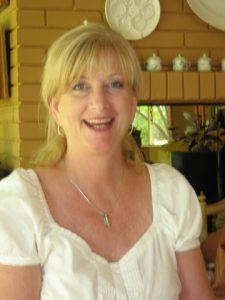 This article by Karen Love, Executive Director of Dementia Action Alliance, reminded me of my dad’s positive outlook. It inspired and touched me and I wanted to share it with you.
This article by Karen Love, Executive Director of Dementia Action Alliance, reminded me of my dad’s positive outlook. It inspired and touched me and I wanted to share it with you.
Live Well with Dementia
By Karen Love, DAA Executive Director
In 1968, Robert Rosenthal and Lenore Jacobson published groundbreaking research that showed teacher expectations of students became self-fulfilling prophecies. At the beginning of a school year, first and second grade students’ IQs were tested. The researchers randomly selected a group of students regardless of their actual test results and led the teachers to believe that this group was capable of great academic achievement. The teachers, perhaps unwittingly, gave the students with the presumed higher IQs more positive reinforcements.
At the end of the year, the students were retested. The group labeled high academic achievers did, in fact, show higher achievement than the other students. Robert Rosenthal summarized this research finding as – “What one person expects of another can come to serve as a self-fulfilling prophecy.” This outcome, retested and proven by many others over the years, has become widely known as the Pygmalion Effect.
The dynamics of the Pygmalion Effect have significant impact for those who want to live well with dementia. There is abundant anecdotal evidence among person-centered dementia care experts that the Pygmalion Effect similarly applies. Family, friends, and others may have low expectations regarding what people living with dementia can and cannot do and how they can function and live. While they may not even be consciously aware of this view, these lowered expectations affect every aspect of the relationship. They don’t engage, interact, and provide opportunities for interesting and fun activities at the same level they would if their expectations were higher.
I experienced the Pygmalion Effect this past week at a memory care assisted living community. I saw a resident sitting alone, apart from the others. I asked a staff member about her and was told she had very advanced dementia.
“What does she like to do?” I asked.
“Nothing, she can’t do anything.”
I knelt beside her and offered a small pillow covered in a soothing, tactile fabric. She immediately started stroking the pillow and then explored the seams. Her expression turned sweet and serene. Touching the fabric was comforting to her. As I was getting ready to leave, the woman’s daughter arrived. I introduced myself and described how much her mother enjoyed the tactile pillow.
“Mom was a seamstress and loves the feel of fabric,” her daughter said, smiling at her mother. “I should bring one of the lap quilts she made when I visit.”
Her daughter was reminded of something her mother liked to do and she felt grateful she could bring something that would please her mom.
I was reminded how important it is to have interesting and engaging items when we visit. Examples include scented lotion, a tactile pillow or fabric scraps, and an enjoyable short story to read aloud.
Helping someone live well with dementia invites us to open our eyes, our hearts, and change our mindset. Instead of perceiving limitations, we can spark the Pygmalion Effect by setting positive expectations. We can help make living fully with dementia a self-fulfilling prophecy.
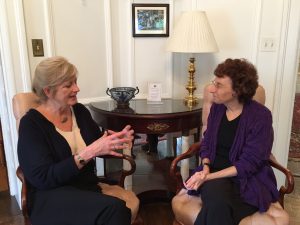 Karen Love, gerontologist – Executive Director, Dementia Action Alliance – Powered by People with Purpose
Karen Love, gerontologist – Executive Director, Dementia Action Alliance – Powered by People with Purpose
Deborah Shouse is the author of Connecting in the Land of Dementia: Creative Activities to Explore Together and Love in the Land of Dementia: Finding Hope in the Caregiver’s Journey.
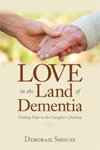
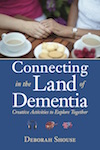
Adapting to Dementia: Laurie Scherrer’s Inspiring Story
“I’m having a slow day,” Laurie Scherrer says, when I call her Pennsylvania home for our scheduled conversation on adapting to dementia. “So bear with me.”
It was easy to bear with Laurie, as she is bright, positive, articulate, insightful, and authentic.
I met her during a telephone interview for the esteemed podcast, Alzheimer’s Speaks, which she co-hosted along with founder Lori La Bey. I was so impressed with both of the women’s insights and interviewing abilities, and I wanted to learn more about how Laurie managed her life with early onset dementia. Here are some highlights from our conversation.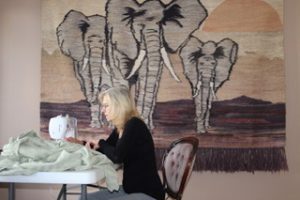
From Sales Leader to Closet Cleaner
How do you go from excelling in a distinguished business career as a top manager and sales leader to becoming an unemployed 55-year-old woman who can no longer do a simple math problem or weed her prized garden?
That’s what happened when Laurie Scherrer was diagnosed with early onset dementia in 2013. After days of languishing at home, cleaning out closets, and feeling like a complete nobody, she realized she needed to take action. And being a woman filled with determination and creativity, she did just that, with her husband offering his unwavering support.
“I have a passion for excellence and the recognition that comes with it,” Laurie says. “Being Number One in sales drove me.”
Since she had nothing to push towards, she turned toward writing blogs and to her former passion for sewing, so she’d once again feel accomplished. Plus, Laurie wanted something tangible to give to her family members, something that said, “I love you.”
Forgetting the Curves and Going Straight
In her earlier days, before her career consumed much of her time, Laurie was an accomplished seamstress, reveling in creating costumes for church programs. She had loved sewing quilts and clothes and decided she’d return to her former hobby.
She sat down with yards of fabric, ready to cut quilting squares. But hard as she tried, she could not figure out how to cut the fabric. She was slumped over her sewing machine, weeping, when her neighbor dropped by.
“I can’t do this anymore,” Laurie said.
“I’ll help you,” her neighbor said.
She brought over a cutting board with lines in it and talked Laurie through the process of cutting the cloth.
“Once she helped me lay it out, I could do it again,” Laurie says. 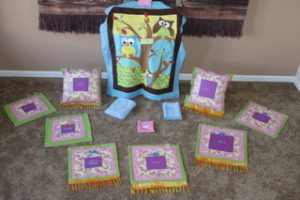
Laurie has since created blankets, pillowcases, burping cloths, and more for her family.
“The straight lines are working for me,” she says.
Noticing the Blessings
Laurie is making the most of her life. She treasures her glorious back yard and her deepened relationship with nature.
“Before, I was so busy, I never saw all the beauty around me,” she says.
She also treasures her worldwide friendships with people living with dementia, which she nourishes through video chatting and posting on Facebook. She and some chat friends recently started a virtual spiritual dementia café, where they read, discuss scripture and pray with and for people from all over the world.
Most of all she loves knowing she is giving back and helping others through her writing, speaking, radio hosting, and advocacy.
Teaming Up to Produce Great Results
Laurie and her husband work together to help her live a vibrant life. Here are their tips:
- Have a designated place and time to escape to, with no phones or email, so you can talk, cry, and really express yourself.
- Talk through the tough times. Notice when someone has a difficult day and figure out how you can improve things.
- Work together to adapt beloved activities.
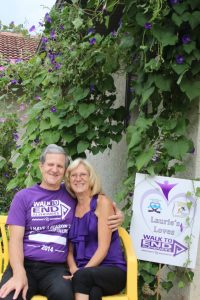
- Laugh as much as possible.
- Be thankful for every good moment.
I know you’re going to want to know more about this remarkable woman and her tips for adapting to dementia. Visit https://dementiadaze.com/about-me/
Deborah Shouse is the author of Connecting in the Land of Dementia: Creative Activities to Explore Together and Love in the Land of Dementia: Finding Hope in the Caregiver’s Journey.


Finding the Holiday’s Spirit
This story from Love in the Land of Dementia: Finding Hope in the Caregiver’s Journey celebrates finding the holiday’s spirit. Here’s to a season of peace, light, joy, and meaningful connections.
When I walk through the doors of the nursing home, I find my mother in her wheelchair, right in front of the medication cart, right behind the central nursing station, where nurses, delivery people, staff and family members congregate. Mom is bent over, her baby doll lying across her lap. When I walk up to her, I ratchet up my energy and widen my smile. I am preparing to clown her into a reaction.
Later my father will ask if I think she recognized me.
“No,” I will have to tell him. “She did not recognize me. But she did smile.”
The smile is important.
My hand waving and head bobbing does its work: Mom does smile, and I can tell she is in her own current version of a good mood.
“Music in the dining room,” the activity board reads, so I wheel her in that direction. An elderly man with a red and white trimmed Santa hat passes us in the hallway.
“Look Mom, there’s Santa,” I tell her.
Having been brought up Jewish, Mom never was all that enthralled with the Claus mythology and she has not changed.
We roll into the dining room just as the show is ready to start. The singer, Thelda, kicks off her shoes and presses play on the boom box. Above the cheerful sound track, she sings Jingle Bells. She dances across the room with the remnants of ballroom steps. She stops in front of Mom and sings right to her. She gets on her knees, so she can look into Mom’s eyes, and keeps singing. Mom notices her and smiles a little.
Thelda moves on, singing to each of the residents gathered around, so intent on making a connection that she often forgets the words.
“Is it all right for your Mom to come to Christmas holiday events?” the activity director had asked me, when Mom moved from the memory care into the skilled care portion of the nursing home.
“Yes, I’d like her to go to any activities. She likes the extra energy.”
I think Mom would approve of my decision, even though she has never celebrated Christmas. Growing up, her immigrant mother held on to the Jewish spirit of her home, kneading dough for Friday evening challah, observing each holiday and prayer period in her own way. Some orthodox women followed the religious law that commanded a small piece of the dough be burned as an offering to God. My grandmother was poor; she did not believe in burning good food, regardless of tradition. So she sacrificed a portion of the dough to her youngest daughter, my mother Fran. She created a “bread tail,” leftover dough that she smeared with butter and sprinkled with sugar and baked. When Mom used to talk about her mother, she always mentioned this special treat.
Even when I was growing up, and we were the only Jewish family in our neighborhood, my mother still did not sing Christmas songs. She did not willingly go to Christmas parties. She let the holiday rush by her, like a large train, whooshing past, ruffling her hair and leaving her behind.
Now, I am singing Christmas carols to my Mom for the first time. She is smiling, though really not at me. But I am sitting beside her while she is smiling and that makes me happy. She has moved beyond the place where the religions are different, beyond the place where she wants to separate the dough and make a sacrifice for tradition. Her new tradition is anyone who can make her smile.
With each song, from White Christmas, to Silver Bells, to Frosty the Snowman, Thelda moves back to Mom, tapping her, nudging her, shaking a bell almost in her face, acting sillier and sillier. Each time, Mom lifts her head and widens her mouth for a second.
For her finale, Thelda puts on a big red nose and sings Rudolph. When she dances in front of Mom with that nose, Mom laughs. For several minutes, Mom stays fixated on the scarlet nose, her face a miracle in pure enjoyment. I laugh too, so delighted to see Mom engaged and absorbed. Then, Thelda dances away and Mom’s face glazes back over.
Two weeks from now, I will bring a menorah and candles into my mother’s room. My father and I will have a short Chanukah ceremony with Mom. She will pick at the shiny paper covering the Chanukah gelt (chocolate candy disguised as money). She will slump over in her chair. But she will come back to life when she sees me, her only daughter, wearing a big red nose as I light the menorah.
Deborah Shouse is the author of Connecting in the Land of Dementia: Creative Activities to Explore Together and Love in the Land of Dementia: Finding Hope in the Caregiver’s Journey.
Enjoy Dementia Inclusive Holiday Cooking
“Who prepared this delicious meal?” a friend asked during a holiday dinner.
I named my brother Dan, our head chef, first. Then I included the support team—myself, my mom, my daughters and nephews.
“Did I help?” Mom whispered as I passed her the mashed potatoes.
“You sure did,” I told her. ”You mashed the potatoes, put the marshmallows on the sweet potato casserole, and mixed the fruit salad.”
“That’s good,” she said. “I like to help.”
Our desire to help and contribute to seasonal celebrations doesn’t end with a diagnosis of dementia. It’s lovely to linger in the kitchen together, preparing food for the holidays. It’s even lovelier when you can adapt and enjoy dementia inclusive holiday cooking so that people of varying abilities can participate.
Rebecca Katz, author of The Healthy Mind Cookbook, sees food as a great equalizer, something anyone can enjoy regardless of abilities. Fixing a delicacy for someone offers a tangible and delicious way to give back.
Here are some tips so you can enjoy dementia inclusive holiday cooking.
- Leaf through a favorite family cookbook or recipe box and use the pictures and recipes as a catalyst for conversation. Ask open-ended questions, such as, ”What does that brownie recipe make you think of?” “What do you like about the holiday season?”
- Select a special recipe to make together. Choose simple, safe and satisfying tasks, such as measuring, adding ingredients , stirring, and tasting.
- Chose a time of day when you’re both rested.
- Create a comfortable kitchen environment, by playing familiar seasonal songs you can both hum or sing along to. Reduce extraneous noise and distractions, such as a television in the background.
- If you wish, take photos during the experience. That way, you can relive the adventure and share with family and friends.
- Indulge in instant gratification, if possible, by sampling your work when the cooking is complete.
- Even if the person living with dementia can’t help prepare food, he can still enjoy sitting in on the action and the conversation.
Whether you’re stirring a pot of orzo or dropping mint leaves into cool water, enjoy your time of creation and connection in the kitchen.
A longer version of this piece originally appeared on Joan Lunden’s excellent website: Enjoy Dementia Inclusive Holiday Cooking. Thanks to Sue Fitzsimmons, MS, ARNP, Judith Fertig, author of The Memory of Lemon, Kate Pierce, LMSW, Alzheimer’s Association Greater Michigan Chapter, and Rebecca Katz, author of The Healthy Mind Cookbook
Deborah Shouse is the author of Connecting in the Land of Dementia: Creative Activities to Explore Together and Love in the Land of Dementia: Finding Hope in the Caregiver’s Journey.
A Thanksgiving Love Story: Bringing Home the Gravy
Thanksgiving changed the year I went vegetarian. I did not mind giving up the tender, moist turkey or the savory oyster-specked stuffing. But giving up the flavorful flow of mushroom-laden gravy was quite another thing. I watched enviously as my family ladled the luscious liquids over their mashed potatoes, turkey and stuffing. As I nibbled dryly on my carrots, green beans and salad, my lower lip protruded. I felt left out and deprived.
My brother, Dan, ever alert to the pouting big sister, came up with a solution.
“Next year I will make special vegetarian gravy just for you,” Dan promised.
Years later, that special vegetarian gravy has become one of my favorite Thanksgiving rituals. I begin fantasizing about it the moment the autumn leaves turn crimson. I know that in mere weeks, my brother and his family will arrive and I will have my yearly boost of family and feasting, highlighted by gravy.
When my brother calls to tell me his travel plans, I write his arrival time and GRAVY on my calendar. The night he comes to town, we make the shopping list together, avidly discussing how many pounds of mushrooms we need for both the carnivore and vegetarian pots of gravy. I relish the early-Wednesday morning trip through the grocery store, where Dan and I and our children carefully select the foods we will be making the next day. We linger in the produce aisle, filling several sacks with gleaming white mushrooms and buying rustling yellow onions.
On Thanksgiving Day, Dan and I and other family members spend long, luxurious hours cooking. Dan mans the stove and I manage the slicing and chopping. Together we snap, peal, slice and dice the vegetables that will accessorize the turkey. I take special pleasure in wiping clean and slicing the mushrooms, then bringing my brother the brimming bowlful. When he has nodded his approval, I get out the old copper pot I bought in Germany in the early seventies. This year, Dan is improving his already amazing gravy. With his new immersion blender, he creates a rich base of caramelized onions, whose flavor surpasses that of the lowly vegetable cube. He adds in a little flour, then gentles the mushrooms into the onion broth. When the pot is bubbling with thickening nectar, he says, “Taste this and see what you think.”
I always think the same thing—“Wow, this is great.”
We are in a state of giddy and satisfied exhaustion by the time our guests arrive. We share grateful prayers with everyone and lay out the feast, including plenty of turkey-based gravy for the rest of the family.
Then comes the moment I have been waiting for: I sit down, my own personal pot of gravy poised by my plate. I cover the mashed potatoes, carrots, green beans, and salad with the aromatic concoction and I savor every bite. But more importantly, I savor the bounty, creativity, and love that have gone into this simple dish. Through this gravy, my brother speaks with his hands and his heart, saying: “I care about you and I am going to make sure you are not left out and that you have something fantastic to eat.”
For that and so much more, I am thankful.
…………
And now, if you’d like to create a Thanksgiving love story, bring home this delicious gravy.
Dan Barnett’s Chicago Style Never-Enough-Mushroom Vegetarian Gravy
Ingredients
2 large onions (chopped)
2 pounds (or more) white button mushrooms sliced (can add some portabellas for enhanced flavor)
1 cup of white wine (of lesser quality)
Salt & pepper to taste
Olive oil
Directions
To create the gravy base:
In a four -quart pot, pour a thin layer of olive oil and turn the burner on medium.
Add the onions and sauté for10-15 minutes until they are caramelized (golden brown)
Add water until the pot is about half full.
Simmer slowly for 30 minutes.
Blend the onion water mixture using either an immersion blender or by transferring the mixture to a food processor.
Once you have the gravy base
Add the 2 pounds (or more) of sliced mushrooms, white wine and fill the pot with water until it is 3/4 full.
Simmer for 30 minutes and season to taste with salt and pepper.
###
Deborah Shouse is the author of Connecting in the Land of Dementia: Creative Activities to Explore Together and Love in the Land of Dementia: Finding Hope in the Caregiver’s Journey.
At Long Last: A Page-Turning Love Story
My hands trembled as I reached out my arms. For three long years I’d been working toward this meeting and yearning for this moment. Now, it was finally here. She was more beautiful than I had imagined, with a pleasing weight, just right for holding, just right for spending long hours with. From a glance, her personality seemed strong and purposeful and yet her warm, colorful exterior told me she would be easy to read. As she gradually opened up to me, I felt her power, her accessibility, her willingness to share ideas and wisdom. She felt great; she looked great; and she was brimming with exciting new ideas. Three long years and finally, she was in my arms. I hugged her tightly. At last I was holding my new book, Connecting in the Land of Dementia: Creative Activities to Explore Together
What makes this book unique? It’s the amazing people who contributed to it. During the writing process, I interviewed dozens of innovators across the globe, gathering ideas that engage the creative spirit so you can continue to experience meaningful moments throughout the dementia journey. These luminaries inspired me every step of the way and I am eager to share their ideas with you.
This book is brimming with easy projects using music, art, movies, cooking, gardening, and more. Here are some of the benefits you can look forward to when you do these activities together: Increased energy and socialization, an improved sense of purpose, reduced anxiety, and chances to express yourselves in new and meaningful ways.
Here’s even more good news about the ideas in this book. They’re adaptable for all ages and abilities, and you don’t need to have any special talents. Simply incorporate them into your daily routine and you’ll enrich your time together.
Marc Wortmann, Executive Director, Alzheimer’s Disease International, called the book “A ‘must read’ for every care partner because it really helps you to look at things differently!”
If you’re in the Kansas City area, please join us for the book launch on Sunday afternoon, October 9th, at 1:30 for a reception in the Truman Forum at the Plaza Library. The free presentation will begin at 2:00 This lively program, filled with ideas, stories, and songs, features myself and my partner Ron Zoglin, musical luminaries Rod Fleeman and Cynthia Schroer, and guest speaker Michelle Niedens from the Heart of America Chapter, Alzheimer’s Association.
RSVP 816-701-3407
For those of you in the Washington DC area, please join us at the free Alzheimer’s Foundation of America Caregiver’s Conference on Thursday September 29. We’ll be presenting there, along with other experts in the field. Click here to register.
We recently heard from several readers, saying, “This book is going to help so many people. I’m recommending it to my friends and colleagues.”
That’s what this is all about: enriching people’s lives through meaningful engagement.
It’s a challenge, bringing a new book into the world and we welcome your ideas and help in spreading the word about the book and the event.
You can order a copy now from Rainy Day Books, our book-seller for the event, or online.
Here is some advanced praise:
“A thoughtful and positive guide to the very thing I find myself constantly advocating to doctors, caregivers, and family members—social stimulation and creative arts will limit the need for psychiatric medication and improve the quality of life for those with dementia more than anything else.” Doug Wornell, MD, Life Solutions Group for Geriatric and Neurological Psychiatry
“Buy this book, read it, highlight what inspires you. As you make notes and bend pages to personalize this guide, you are creating a family treasure.” Carol Bradley Burdock, Founder of Minding Our Elders
“Deborah Shouse provides a great public service by shining light on the numerous creative activities that can meaningfully engage the minds and spirits of persons living with dementia. From personalized music to storytelling, Shouse makes it easy for caregivers to understand the various options they have to help their loved ones navigate through their everyday lives.” Dan Cohen, MSW Founding Executive Director, MUSIC & MEMORYsm
An Insider’s Look at Connecting with Music
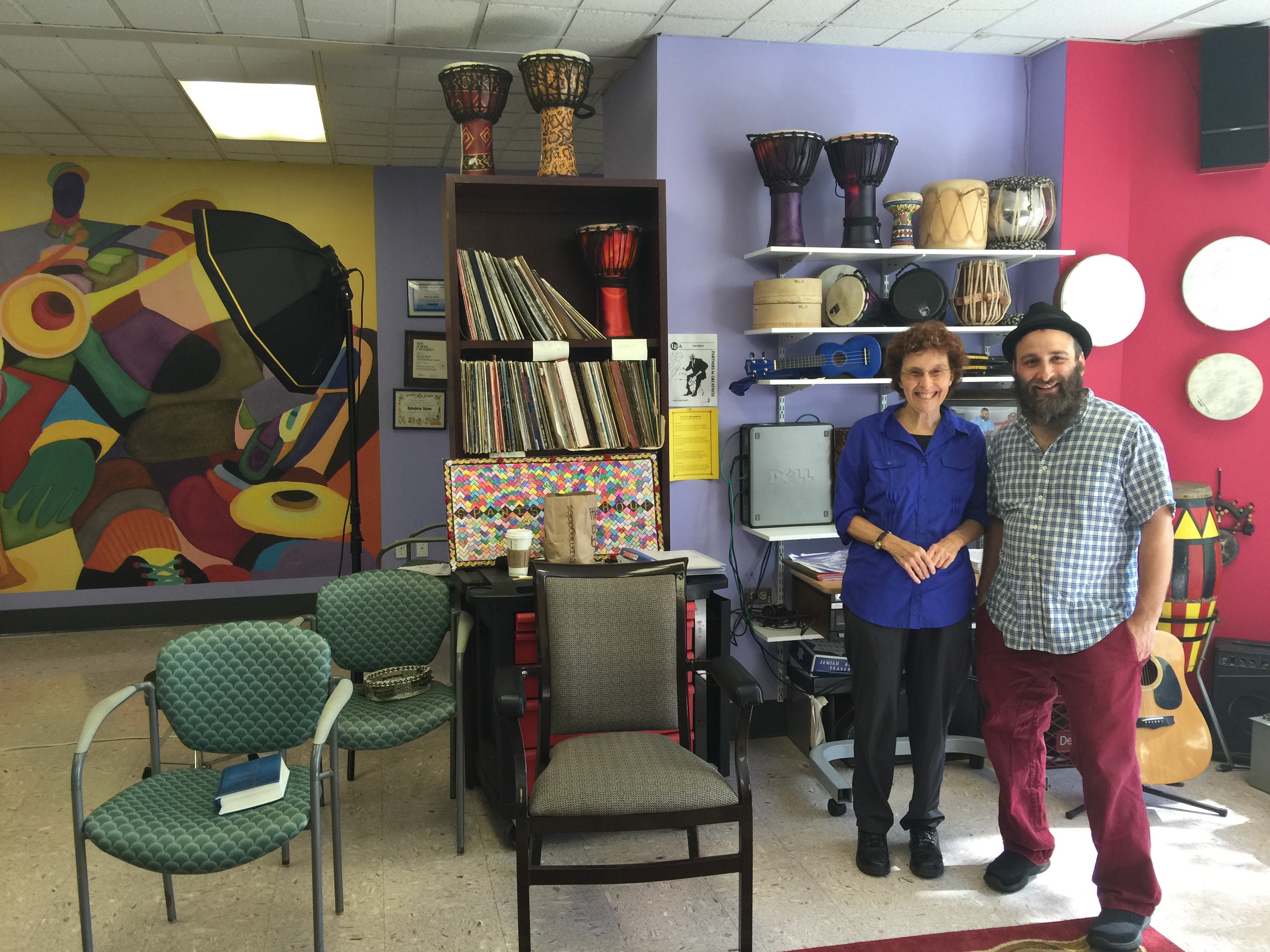 Encountering fascinating people is always a highlight of our travels. Our recent trip to New York City was dedicated to meeting innovative people in the field of creativity and dementia. I’d interviewed many of these experts for Connecting in the Land of Dementia via telephone or Skype and I was looking forward to learning from them in person. These are the people who are changing the world and who inspire us to go out there and make our part of the world better. In the next months, I’ll be sharing some of their wisdom with you.
Encountering fascinating people is always a highlight of our travels. Our recent trip to New York City was dedicated to meeting innovative people in the field of creativity and dementia. I’d interviewed many of these experts for Connecting in the Land of Dementia via telephone or Skype and I was looking forward to learning from them in person. These are the people who are changing the world and who inspire us to go out there and make our part of the world better. In the next months, I’ll be sharing some of their wisdom with you.
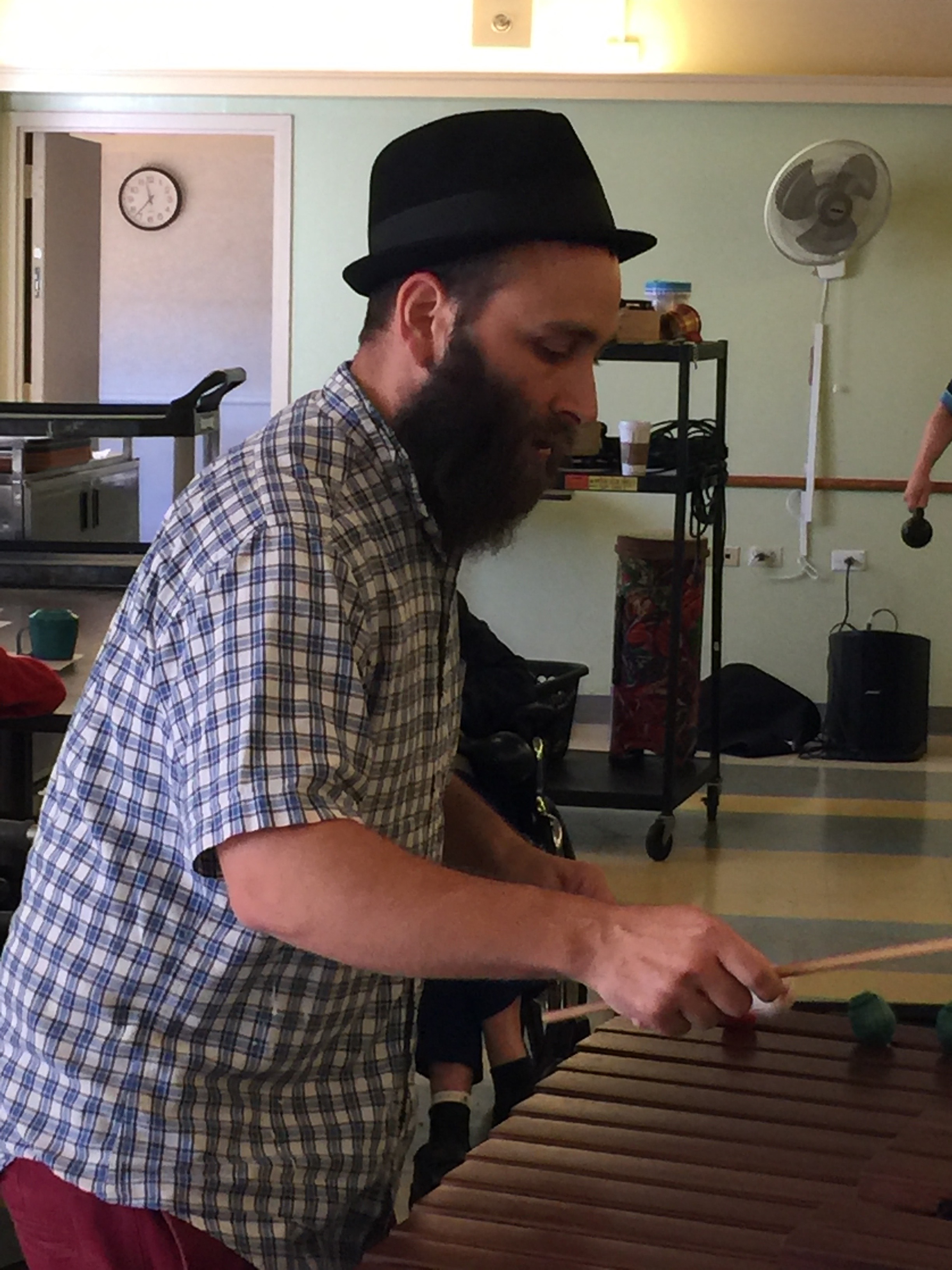 Marlon Sobol grew up with music and understands its universal healing powers. We visited him at a care community in White Plains, NY, where he works as a full-time music therapist. We watched in awe as Marlon worked his carefully orchestrated magic. He started with soothing tones from the marimba, moving into singing everyone’s name as a way of connecting with them. Then he played familiar songs to invite singing along. Finally, he added soundtracks of West African and Caribbean music, which inspired the staff and some of the residents to burst into dancing. In honor of our visit, Marlon played and sang, “Going to Kansas City,” which made us leap out of our chairs, sing along and dance.
Marlon Sobol grew up with music and understands its universal healing powers. We visited him at a care community in White Plains, NY, where he works as a full-time music therapist. We watched in awe as Marlon worked his carefully orchestrated magic. He started with soothing tones from the marimba, moving into singing everyone’s name as a way of connecting with them. Then he played familiar songs to invite singing along. Finally, he added soundtracks of West African and Caribbean music, which inspired the staff and some of the residents to burst into dancing. In honor of our visit, Marlon played and sang, “Going to Kansas City,” which made us leap out of our chairs, sing along and dance.
Here is a tip from Marlon:
“Our names are so important. Music is a way to help people stay connected with their names. I often sing a name as a way of engaging. You can add a name to any simple tune and invite people living with dementia to sing along.”
Click on these shorts videos for other ways to incorporate music and movement into your everyday life.
The power of music and movement
Read more about Marlon’s programs in Connecting in the Land of Dementia: Creative Activities to Explore Together. Order your copy from your favorite independent or online bookstore.

